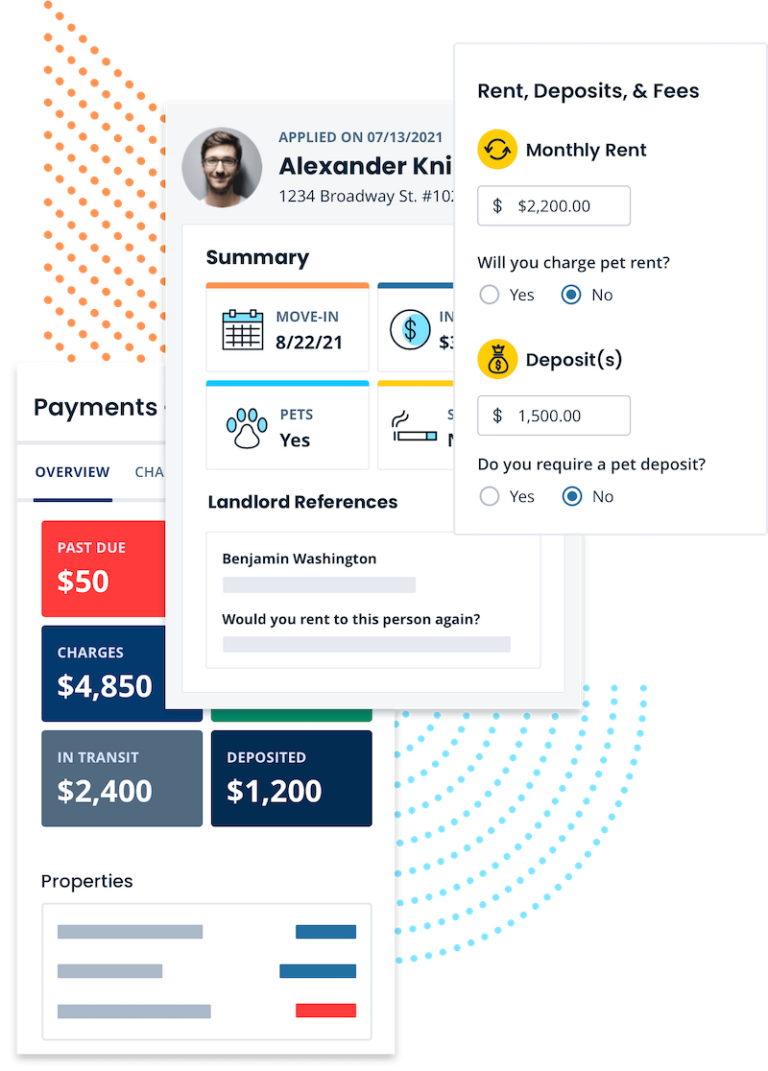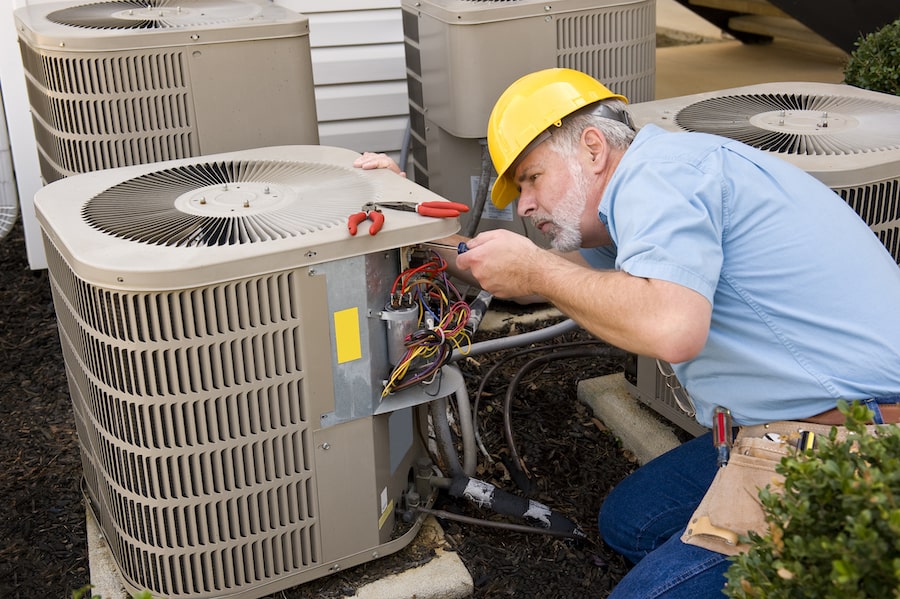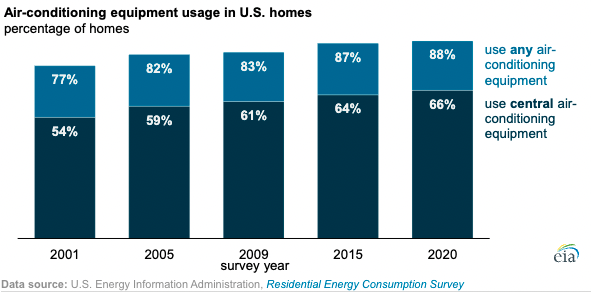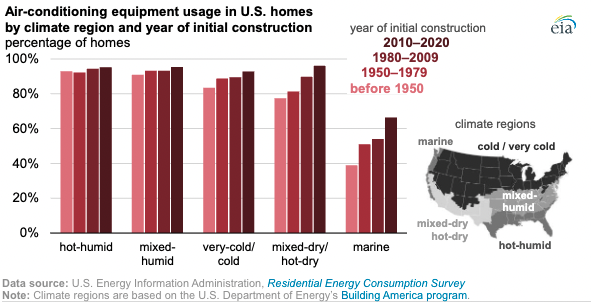When the weather gets warm, the age-old question gets asked: do landlords have to provide AC? The short answer is that it depends on many factors, from where your property is located to what your lease agreement says.
But knowing more is crucial – especially since 88% of U.S. households used air conditioning but only 54.7% of rental listings had it.
In this article, we’ll answer the most commonly asked questions about air conditioning and rental properties, from whether you’re responsible for providing a unit to how much more rent you could collect by installing one.
Streamline Your Rental Property Management


Pro Tip:
There are methods you can explore to keep your tenants cool without buying a central air conditioning unit.
Apartment Air Conditioning Laws
There are no national apartment air conditioning laws; the closest such legislation is the implied warranty of habitability, which varies by state and jurisdiction. Per TransUnion, “in some states, the warranty is met if the landlord complies with local housing codes. That may include regulations regarding topics such as sewage disposal. In others, the warranty doesn’t depend on specific housing codes, but rather upon a court decision.”
Every jurisdiction can define its own interpretation of a “fit” and “habitable” living situation, and these definitions may require more of a landlord than just meeting local housing codes. You might have to prove that you’ve fulfilled your obligation to ensure the property’s habitability. Otherwise, your tenant may be allowed to withhold their monthly rent payment per their tenant rights.
That said, the implied warranty of habitability means that landlords are typically in charge of:
Structural upkeep, both inside and outside the property
Hallway, stairway, and common area maintenance
Plumbing (including cold and hot water), sewage, and ventilation
Checking for environmental hazards
Rodent and insect extermination
Hot and cold water discharge (in appropriate quantities and at reasonable times)
Heating system(s)
You’ll notice that air conditioning isn’t on this list. Many state laws don’t say it’s the landlord’s responsibility to provide air conditioning units outright. But with temperatures rising summer after summer, keep your eyes on your local laws. More jurisdictions are pushing to address cooling systems on a grander scale to protect those who are most impacted by hot temperatures.
Arizona landlords are required to have an air conditioning or cooling system in working order to qualify rental units as safe, fit, and habitable. According to the Arizona Legal Center, “some parts of Arizona have specific standards that apply. For example, in the city of Phoenix, rental units that use air conditioning cannot exceed a maximum temperature of 82 degrees. Evaporative coolers are allowed a slightly higher maximum temperature (86 degrees).”
Additionally, the Low Income Home Energy Assistance Program (LIHEAP), which was originally designed to bring heat to residents with lower incomes in cold winter months, has seen states adapt it to include cooling, per a report from Pew.
Marisa Larson, a manager at LIHEAP Clearinghouse, works within the U.S. Health and Human Services Department to track trends in how states apply, use, and supplement federal funding.
“From what I’ve noticed there has been a shift to cooling,” she said in an interview. “Especially now, there’s more cooling.”
For example, Washington State has rolled out a free air conditioner program under LIHEAP for residents with lower incomes. As of September 2022, 4,000 air conditioners had been distributed.
What If Summers Don’t Get as Hot Here?
You’re not off the hook, even if your summers haven’t surpassed 103 degrees yet and you didn’t mention a cooling system as an amenity.
If there’s an AC unit on property and your lease agreement doesn’t specifically state that you aren’t in charge of AC repair/replacement, a tenant could argue that working AC was implied by the presence of the unit. In some states, including California and Georgia, the law says that the landlord is obligated to maintain any parts of the rental that were working when the tenant moved in.
It’s also worth noting that elderly and/or disabled renters are especially sensitive to heat.
You may receive documentation requesting a reasonable accommodation in the form of a cooling unit, which you would be “required to provide and pay for the structural modification as a reasonable accommodation unless it amounts to an undue financial and administrative burden or a fundamental alteration of the program. If an undue burden or fundamental alteration exists, the recipient is still required to provide any other reasonable accommodation up to the point that would not result in an undue financial and administrative burden on the particular recipient and/or constitute a fundamental alteration” of your business, says the Department of Housing and Urban Development (HUD).

How Much More Could Landlords Make by Providing AC Units?
The answer varies depending on the location of your rental(s). The Midwest Census Region and South Census Region had the highest percentages of households using air conditioning at 92% and 93%, respectively, says the 2020 Residential Energy Consumption Survey.
Newer builds are more likely to use AC in most climate regions, and small multifamily buildings (2-4 units) had an “AC usage rate of 80%, while apartments in larger buildings (5+ units) had an AC usage rate of 85%. By comparison, 90% of single-family detached homes used AC equipment. Households that do not use AC are more likely to be renters rather than owners.”
With this information in mind, the national premium for central air conditioning in a rental is 2.8%, or $40 per month, for the median-valued rental, according to Zillow.
That might not generate the wealth you’re looking for on its own, but offering such a high-demand amenity is a great way to make your listing stand out when marketing a rental property. And with TurboTenant’s free rental management software, you can afford to give your tenants the gift of AC all summer long.
TurboTenant, Inc does not provide legal advice. This material has been prepared for informational purposes only and TurboTenant assumes no responsibility or liability for any errors or omissions in the content of this material. All users are advised to check all applicable local, state, and federal laws and consult legal counsel should questions arise.









